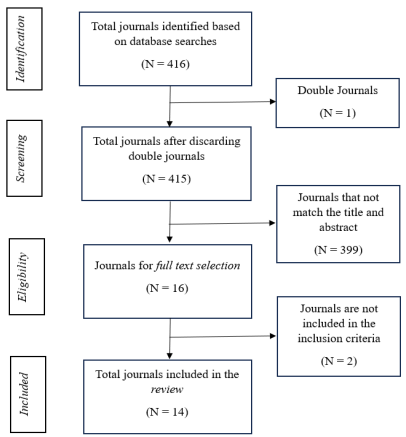
Submission to VIJ 2024-07-17
Keywords
- anxiety,
- emerging adulthood,
- early adulthood,
- student
Copyright (c) 2024 Nadhila Annifa Ichsan, Miqdad Ihkamuddin, Ni’matuzahroh

This work is licensed under a Creative Commons Attribution 4.0 International License.
Abstract
Emerging adulthood is the transition phase from adolescence to adulthood, starting from the age of 18-29 years. At this age, many individuals experience anxiety caused by past experiences. Existing anxiety can affect an individual's mood, thoughts and behavior. This systematic review examines 14 international journals selected from the Scopus database regarding factors causing anxiety in emerging adulthood. If individuals in this phase know the factors that influence anxiety, they can take preventive action to avoid anxiety occurring in themselves. The results found that factors causing anxiety in emerging adulthood include: self-esteem, parenting patterns and bad experiences as children. These findings provide recommendations for conducting further and specific systematic review research and are expected to be a consideration for preventive actions before and during the emerging adulthood phase.
References
- Arnett JJ. Emerging adulthood: The winding road from the late teens through the twenties. Oxford University Press; 2023.
- Arnett JJ. The Oxford handbook of emerging adulthood. Oxford University Press; 2015.
- Nisa IF, Satwika YW. Gambaran Loneliness pada Wanita Dewasa Awal yang Bekerja An Overview of Loneliness in Working Early Adult Women. 2022;
- Nadyandra KR, Nio SR. Hubungan stress akademik dengan motivasi akademik pada mahasiswa yang sedang mengerjakan skripsi. Jurnal Pendidikan Tambusai. 2023;7:3614–3622.
- Németh L, Bernáth L. The mediating role of global and contingent self-esteem in the association between emerging adults’ perceptions of family cohesion and test anxiety. J Adult Dev. 2022;29:192–204.
- Michikyan M. Self-Esteem and Real Self and False Self Presentation on Facebook Among Emerging Adults: The Moderating Role of Social Anxiety. Emerging Adulthood. 2022;10:1361–1375.
- Traino KA, Espeleta HC, Dattilo TM, et al. Childhood Adversity and Illness Appraisals as Predictors of Health Anxiety in Emerging Adults with a Chronic Illness. J Clin Psychol Med Settings. 2023;30:143–152.
- Nurdiansyah EW, Jannah M. Perbedaan kecemasan atlet laki-laki dan perempuan pada mahasiswa unit kegiatan mahasiswa universitas negeri Surabaya. Character: Jurnal Penelitian Psikologi. 2021;8:60–65.
- Marsidi SR, Yaqiin AA, Amsyar A, et al. Gambaran Kecemasan Individu Dewasa di Jakarta, Bekasi, dan Tangerang (JATEBANG): Gejala dan Penyebab. Jurnal Psikologi Terapan (JPT). 2022;5:1–12.
- Widadi RK, Setyawanto A. Obsesi Pemicu Kecemasan Mahasiswa Dalam Bersosialisasi. Afeksi: Jurnal Psikologi. 2022;1:58–65.
- Mulyana A, Nurdin FS, Nurfatwa D. Prokrastinasi akademik, emotion focused coping, dan kecemasan pada mahasiswa. Jurnal Penelitian Psikologi. 2022;13:68–78.
- Sugiharno RT, Susanto WHA, Wospakrik F. Faktor-Faktor yang Mempengaruhi Kecemasan Mahasiswa dalam Menghadapi Tugas Akhir. Jurnal Keperawatan Silampari. 2022;5:1189–1197.
- Chan EWT, Wong KTC, Clark LH. Challenging Parenting Behaviour and Anxiety Disorders in Emerging Adulthood. J Child Fam Stud. 2023;32:663–677.
- Kusumastuti D. Kecemasan dan Prestasi Akademik pada Mahasiswa. Analitika: Jurnal Magister Psikologi UMA. 2020;12:22–33.
- Sitompul R, Wulandari ISM. Hubungan Tingkat Kecemasan Dan Pola Makan Terhadap Kejadian Gastritis Pada Mahasiswa Profesi Ners Universitas Advent Indonesia. Coping. Community of Publishing in Nursing. 2021;9:258.
- Siswanto S. Systematic review sebagai metode penelitian untuk mensintesis hasil-hasil penelitian (sebuah pengantar). Buletin Penelitian Sistem Kesehatan. 2010;13:21312.
- Traino KA, Espeleta HC, Dattilo TM, et al. Childhood Adversity and Illness Appraisals as Predictors of Health Anxiety in Emerging Adults with a Chronic Illness. J Clin Psychol Med Settings. 2023;30:143–152.
- Németh L, Bernáth L. The mediating role of global and contingent self-esteem in the association between emerging adults’ perceptions of family cohesion and test anxiety. J Adult Dev. 2022;29:192–204.
- Jiao C, Cui M, Fincham FD. Overparenting, Loneliness, and Social Anxiety in Emerging Adulthood: The Mediating Role of Emotion Regulation. Emerging Adulthood. 2024;12:55–65.
- Peltz JS, Rogge RD, Pugach CP, et al. Bidirectional associations between sleep and anxiety symptoms in emerging adults in a residential college setting. Emerging Adulthood, 5 (3), 204–215. 2017.
- Shevenell MD, Meteyer K. Influences of femininity and maternal relationships on anxiety and adjustment in emerging adulthood. The Family Journal. 2018;26:369–377.
- Rahmadina A, Nashori F, Andrianto S. The mediating effect of self-esteem on emerging adults’ materialism and anxiety. Psikohumaniora: Jurnal Penelitian Psikologi. 2020;5:1–14.
- Metcalf CA, Arch JJ, Greer JA. Anxiety and its correlates among young adults with a history of parental cancer. J Psychosoc Oncol. 2017;35:597–613.
- Luo L, Yuan J, Bi S, et al. A model linking digital media dependence, exercise empowerment, and social physique anxiety among emerging adulthood college students. Front Psychol. 2023;14.
- Fu H, Wang B. The effect of risk perception on anxiety in emerging adulthood under the local outbreak of COVID-19: a conditional process analysis. Front Psychol. 2022;13:759510.
- Saragosa-Harris NM, Moreira JFG, Waizman YH, et al. Neural representations of ambiguous affective stimuli and resilience to anxiety in emerging adults. Biol Psychol. 2023;182:108624.
- Smout A, Lazarus RS, Hudson JL. The relationship between parenting and anxiety in emerging adulthood. Cognit Ther Res. 2020;44:182–195.
- Goger P, Rozenman M, Gonzalez A. The association between current maternal psychological control, anxiety symptoms, and emotional regulatory processes in emerging adults. J Behav Ther Exp Psychiatry. 2020;68:101563.
- Cermakova P, Chlapečka A, Andrýsková L, et al. Socioeconomic and cognitive roots of trait anxiety in young adults. Soc Cogn Affect Neurosci. 2022;17:703–711.
- Harini N. Terapi warna untuk mengurangi kecemasan. Jurnal Ilmiah Psikologi Terapan. 2013;1:291–303.
- Wolters NE, Mobach L, Wuthrich VM, et al. Emotional and social loneliness and their unique links with social isolation, depression and anxiety. J Affect Disord. 2023;329:207–217.
- Bisson KH. The effect of anxiety and depression on college students’ academic performance: Exploring social support as a moderator. 2017;
- Kaswadi KA, Malik A, Keat OB. Anxiety and academic achievement among undergraduate students. J Manag Sci. 2018;16:11–18.
- Choi JM, Yang JI, Kang SJ, et al. Association between anxiety and depression and gastroesophageal reflux disease: results from a large cross-sectional study. J Neurogastroenterol Motil. 2018;24:593.